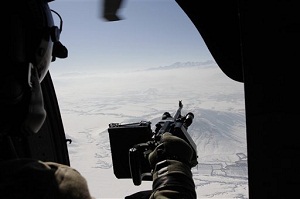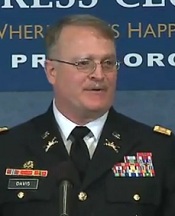| Home | Blog | Ask This | Showcase | Commentary | Comments | About Us | Contributors | Contact Us |

Why does Congress refuse to even ask the right questions about Afghanistan?ASK THIS | May 152, 2012Army Lt. Col. Danny Davis, who broke ranks to debunk official reports of progress, cites multiple journalistic and analytical reports that back his perspective, and wonders: Isn't Congress the least bit curious about whether it's been badly deceived? No congressional committee appears the least bit interested in what he has to say, but Army Lt. Col. Daniel L. Davis --who earlier this year decided to blow the whistle on the false and intentionally misleading happy-talk the American public is hearing from the top brass about Afghanistan -- had a chance to speak his mind at a press conference on Thursday, May 31, hosted by bipartisan anti-war Reps. Barbara Lee (D-CA), Walter Jones (R-NC), and others. Following is the slightly edited prepared text of his remarks: Early last February I published an analysis of the Afghan war in the Armed Forces Journal in which I challenged the accuracy and veracity of how some of our senior defense officials have characterized the state of affairs in
In order to place what follows in context, it is useful to first emphasize the official statement from NATO following the recently concluded Chicago Summit. According to the declaration signed by the heads of state of NATO: “In the ten years of our partnership the lives of Afghan men, women and children, have improved significantly in terms of security, education, health care, economic opportunity and the assurance of rights and freedoms. There is more to be done, but we are resolved to work together to preserve the substantial progress we have made during the past decade.” But here’s what others have to say on this very subject: In January of this year, Sarah Chayes, former NPR reporter and former civilian advisor to General Stanley McChrystal during his tenure as ISAF commander, wrote in an op-ed in the LA Times: “Is One of “As in “If there is a solution, it lies in accepting the reality that the present strategy will almost certainly fail to secure the south and the east of “Pursuing today’s 'strategy' and illusions offers almost no hope at all.” In another report, Cordesman wrote that the transition planners "need to stop spinning claims of progress driven by uncertain methodologies, uncertain databases, or analytic structures that are not related to any other aspect of data collection and analysis." He continued: “They need to address corruption, the steady outflow of capital, the inability to determine what portion of spending is actually spent in – and stays in – "At present, no official source of economic data and analysis – Cordesman concluded his observations by noting, “Credible transition planning cannot be based on systematic dishonesty and omission of key variables...” A few weeks ago an Afghan group, the Afghanistan Independent Human Rights Commission published a report on what many “In absence of central government’s authority and rule, the ALP members have harassed the public population. This causes disorder, insecurity, and lack of public trust in the government… According to a number of officials, there are individuals within the ALP who have bad war records and who are even serial killers. This makes people lose their confidence in the ALP and even in the government. …the ALP has been accused of committing such acts as harassment of people, beating, murder, robbery, abduction, banditry, extortion, forcing people to pay (illegal) ushr tax, poll tax, and the like… Corruption in the government, particularly in the justice system, has reduced public confidence into government institutions in general and in judicial organs in particular… There is also the apprehension that the growing power of the ALP in outlying areas without serious government monitoring and control can even turn the ALP into the armed opposition resisting government authority and the rule of law.” The final sentence of the summary notes flatly: “With its existing composition, the ALP cannot win public support and trust in and provide stable and durable security for communities.” Two months ago, the International Crisis Group published an analysis of the situation in “A negotiated political settlement is a desirable outcome to the conflict in Former British Ambassador to “No doubt Petraeus has hammered the Taliban extremely hard. I am sure that some of them are more willing to parlay. But, equally, for every dead Pashtun warrior there will be 10 pledged to revenge. I’m afraid I don’t think the present increase in violence is right or proper and its nightly slaughter of the Taliban without a political strategy in place is tactics, not strategy. It is profoundly wrong and it is not conducive to a stable political settlement.” And sounding perhaps the most sobering warning of all, a German think-tank published an analysis of the situation in “In their public assessments, both the US-dominated ISAF and the international community suggest that the transition process is on the right path. Their assessments, however, are characterized by calculated optimism and based on unfounded assumptions, such as their anticipation that the Taliban will participate in constructive talks. An unprejudiced analysis, in context, gives us little reason to conclude that the preconditions for a positive trend – for instance a cessation of asymmetric warfare and a transition to more effective governance – will be fulfilled in the medium term." The report then goes on to offer four possible scenarios for how things will play out between now and 2014 given our current strategy, and all of them are bad. But the worst of these is Number 3, about which the authors write: “Despite overriding economic and profit interests, the ethno-political polarization intensifies to such an extent that the army and the police as well as the Karzai government collapse. Local warlords and uncontrollable insurgent groups battle each other; crime spirals out of control. Central power cease to exist even in nominal terms; it is a war of shifting alliances or one in which 'everyone fights everyone.'” It is crucial to note that all the above statements, reports, and analyses have been produced not by some propaganda arm of the Taliban – but by people on our side. They want us to succeed as much, and in some cases more, than we do. How can it be then that with such an unbridgeable gulf between official statements and the large and growing body of work that comes to a very different conclusion, Congress refuses to even ask the questions? Though some of the Members in this room have formally and informally requested of Congressional leadership to hold formal hearings, to date their requests have been met with silence. How could it be that not one of the estimated 250 Committees and sub-committees in both the House and Senate finds it of sufficient importance even to hold a hearing into the matter? The implications couldn’t be greater. If the vast and diverse body of work I have included here is right, our official policy will not only fail to accomplish our national objectives, it may perversely contribute to its failure. Of greater concern to me personally, however is this: the men and women of our Armed Forces will pay with their lives, their body parts, their flesh and blood, and suffer continued degradation to their emotional and psychological well-being in pursuit of a strategy that will not benefit our country. With all appropriate respect and honor to this body, I must again ask: how could it be that not one committee or sub-committee chairman or chairwoman in the entire United States Congress finds the matter of sufficient importance that they will take action to ascertain the truth? So many in If we genuinely value the lives and sacrifice the Members of our Armed Forces make for all of
|
|||||||||


 To the contrary, the views I expressed in that analysis are most assuredly not those of only one person. In fact a considerable body of evidence and published work by numerous and highly credible organizations and individuals comes to the same conclusions. In the limited time I have here today I will share a few of the more profound findings, observations and conclusions from these reports which have direct bearing on the efficacy of our strategy.
To the contrary, the views I expressed in that analysis are most assuredly not those of only one person. In fact a considerable body of evidence and published work by numerous and highly credible organizations and individuals comes to the same conclusions. In the limited time I have here today I will share a few of the more profound findings, observations and conclusions from these reports which have direct bearing on the efficacy of our strategy.